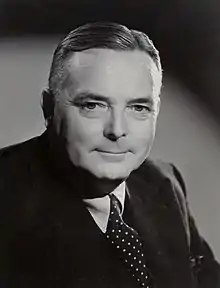John Wilmot, 1st Baron Wilmot of Selmeston
John Charles Wilmot, 1st Baron Wilmot of Selmeston PC (2 April 1893 – 22 July 1964) was a British Labour Party politician.[1] He served under Clement Attlee as Minister of Aircraft Production from 1945 to 1946 and as Minister of Supply from 1945 to 1947.
The Lord Wilmot of Selmeston | |
|---|---|
 | |
| Minister of Aircraft Production | |
| In office 4 August 1945 – 1 April 1946 | |
| Prime Minister | Clement Attlee |
| Preceded by | Ernest Brown |
| Succeeded by | Office abolished |
| Minister of Supply | |
| In office 3 August 1945 – 7 October 1947 | |
| Prime Minister | Clement Attlee |
| Preceded by | Andrew Rae Duncan |
| Succeeded by | George Strauss |
| Personal details | |
| Born | 2 April 1893 |
| Died | 22 July 1964 (aged 71) |
| Nationality | British |
| Political party | Labour |
| Alma mater | King's College London |
Education
Wilmot was educated at Hither Green central school, and went on to pursue evening classes at Chelsea Polytechnic and at King's College London.
Political career
He was elected as Member of Parliament (MP) for Fulham East at a by-election in 1933, but lost his seat at the 1935 general election.[2] His victory in the Conservative-held seat at the by-election was something of a surprise. A correspondent reporting the result in The Glasgow Herald described his victory as "an unpleasant surprise", noting that while it was not expected that his Conservative opponent would hold the seat with "a large majority, there was a confident hope that he at least would win through. Certainly a Labour majority of 4840 was not in the picture." The same report argued various factors as bringing about his victory including apathy of Conservative and Liberal voters compared to the strong support he received from Labour electors. The report also argued that Germany's withdrawal from the League of Nations and the World Disarmament Conference had caused a "War scare" which Wilmot's supporters fully exploited to win votes, particularly from female voters in the constituency.[3]
Wilmot was elected as an alderman of London County Council in November 1937, remaining a member until 1945.[4][5] He returned to the House of Commons at another by-election, in 1939 as MP for Kennington.[6] Wilmot was re-elected to Parliament at the 1945 election for the Deptford constituency,[7] and served in Clement Attlee's post-war government as Minister of Aircraft Production from 1945 to 1946, when that office was abolished, and as Minister of Supply from 1945 to 1947. He was admitted to the Privy Council in 1945. He retired from the House of Commons at the 1950 general election and was raised to the peerage as Baron Wilmot of Selmeston, of Selmeston in the County of Sussex, on 30 January 1950.[8]
Personal life
Lord Wilmot of Selmeston died on 22 July 1964, aged 71.
References
- Ben Pimlott, ‘Wilmot, John Charles, Baron Wilmot of Selmeston (1893–1964)’, rev. Oxford Dictionary of National Biography, Oxford University Press, 2004; online edn, May 2008, accessed 8 December 2009
- "leighrayment.com House of Commons: Fairfield to Fylde South". Archived from the original on 11 September 2018. Retrieved 14 September 2010.
- "East Fulham Election. Some Causes of the Labour Victory. Effect of International Events". The Glasgow Herald. 27 October 1933. p. 10. Retrieved 31 October 2020.
- "L.C.C. Estate at Tulse Hill". The Times. 24 November 1937. p. 11.
- Stuart Ball, ed. (1999). Parliament and politics in the age of Churchill and Attlee: the Headlam diaries, 1935–1951. Camden Fifth Series. Royal Historical Society and Cambridge University Press. p. 432. ISBN 978-0-521-66143-0.
- "leighrayment.com House of Commons: Keighley to Kilkenny". Archived from the original on 2 October 2018. Retrieved 14 September 2010.
- "leighrayment.com House of Commons: Dagenham to Deritend". Archived from the original on 3 October 2011. Retrieved 14 September 2010.
- "No. 38841". The London Gazette. 14 February 1950. p. 786.
External links
- Hansard 1803–2005: contributions in Parliament by John Wilmot
- A film clip "Longines Chronoscope with Lord John Wilmot" is available at the Internet Archive
| Parliament of the United Kingdom | ||
|---|---|---|
| Preceded by Sir Kenyon Vaughan-Morgan |
Member of Parliament for Fulham East 1933–1935 |
Succeeded by Hon. William Astor |
| Preceded by Sir George Harvey |
Member of Parliament for Kennington 1939–1945 |
Succeeded by Charles Gibson |
| Preceded by Walter Green |
Member of Parliament for Deptford 1945–1950 |
Succeeded by Jack Cooper |
| Political offices | ||
| Preceded by Ernest Brown |
Minister of Aircraft Production 1945–1946 |
Office abolished |
| Preceded by Andrew Duncan |
Minister of Supply 1945–1947 |
Succeeded by George Strauss |
| Peerage of the United Kingdom | ||
| New creation | Baron Wilmot of Selmeston 1950–1964 |
Extinct |